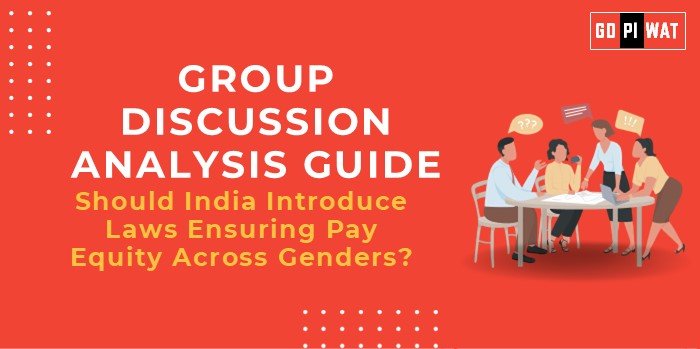📋 Comprehensive Analysis Guide: Should India Introduce Laws Ensuring Pay Equity Across Genders?
🌐 Group Discussion (GD) Analysis Guide
Introduction to Pay Equity in India
- Opening Context: “Gender pay inequity remains a persistent global concern. In India, women earn 82% of what men earn for the same work, highlighting structural barriers that demand policy intervention.”
- Topic Background: Pay equity refers to eliminating gender-based wage disparities, ensuring equal compensation for equal work regardless of gender. Countries like Iceland have already introduced pay equity laws with measurable success. India’s corporate and informal sectors continue to reflect wage gaps due to societal norms and lack of legal enforcement.
📊 Quick Facts and Key Statistics
- 📉 Gender Pay Gap: 18% in India as of 2023 (World Economic Forum).
- 👩💼 Workforce Participation: Women make up 24% of India’s workforce, among the lowest globally (ILO).
- 🏭 Sector Inequity: Informal sector: 90% workforce (majority women) earns 40% less than men (Oxfam Report 2023).
- 🌍 Global Rank: India ranks 127th in WEF’s Global Gender Gap Index (2023).
- ⚖️ Legal Benchmark: Iceland’s 2018 pay equity law mandates penalties for wage discrimination.
🌟 Stakeholders and Their Roles
- 🏛️ Government: Create legislation and enforcement mechanisms to ensure pay equity.
- 🏢 Private Corporations: Commit to gender-equal policies in hiring, appraisal, and salary structures.
- 👩🏭 Employees: Demand transparency and accountability regarding wage standards.
- 📊 NGOs and Think Tanks: Drive awareness, data-driven insights, and policy advocacy.
- 🌐 Global Institutions: International frameworks like SDG 5 (Gender Equality) encourage progress.
🏆 Achievements and Challenges
Achievements
- 👶 Maternity Benefits Act: Extended paid leave encourages female workforce retention.
- 🏢 Corporate Diversity Initiatives: Companies like Tata and Infosys focus on equal opportunities.
- 🌍 Global Examples: Iceland, Norway, and Sweden lead pay equity laws, achieving wage transparency.
Challenges
- ⚙️ Informal Sector Dominance: Limited access to fair wage laws for 90% of working women.
- 🔒 Lack of Transparency: Salary structures often lack openness in Indian companies.
- 🚧 Gender Bias: Social norms restrict women from leadership roles and high-paying sectors.
Global Comparisons
- 🇮🇸 Iceland: Implemented the world’s first mandatory pay equity audit system.
- 🇸🇪 Sweden: Achieved 87% gender wage equality through progressive labor laws.
Case Study
Iceland’s Pay Equity Law: The legislation mandates annual audits; companies failing compliance are fined, leading to measurable wage gap reduction.
📚 Structured Arguments for Discussion
- 🟢 Supporting Stance: “Mandatory pay equity laws will ensure systemic wage fairness and bridge India’s gender gap in the workplace.”
- 🔴 Opposing Stance: “Introducing laws alone won’t address deep-rooted gender norms; education and skill-based empowerment are more effective.”
- ⚖️ Balanced Perspective: “While legal enforcement is crucial for wage transparency, complementary efforts in education, cultural change, and skills training are essential for holistic progress.”
💡 Effective Discussion Approaches
- Opening Approaches:
- 📊 Statistical Approach: “India’s 18% gender pay gap reflects systemic inequities demanding policy intervention.”
- 📖 Case Study Opening: “Iceland’s pay equity law has led to measurable results, proving the effectiveness of legal measures.”
- Counter-Argument Handling:
- ✔️ Example: “While informal sectors pose challenges, phased implementation of legal mandates and labor reforms can bring equity.”
📊 Strategic Analysis of Strengths and Weaknesses
- 🌟 Strengths: Legal precedence, corporate initiatives, global frameworks (SDG 5).
- ⚠️ Weaknesses: Informal sector gaps, cultural biases, enforcement challenges.
- 💼 Opportunities: Create transparency, empower women, attract global investments.
- ⚡ Threats: Resistance to compliance, rising wage costs, short-term business pushback.
🎓 Connecting with B-School Applications
- 📈 Real-World Applications: Gender-inclusive policies enhance organizational performance, aligning with corporate sustainability goals (ESG).
- 📋 Sample Interview Questions:
- “How can India balance pay equity laws with corporate competitiveness?”
- “What role do private companies play in achieving gender wage equality?”
- 💡 Insights for B-School Students: Pay equity links to HR strategies, corporate governance, and inclusive business leadership.


